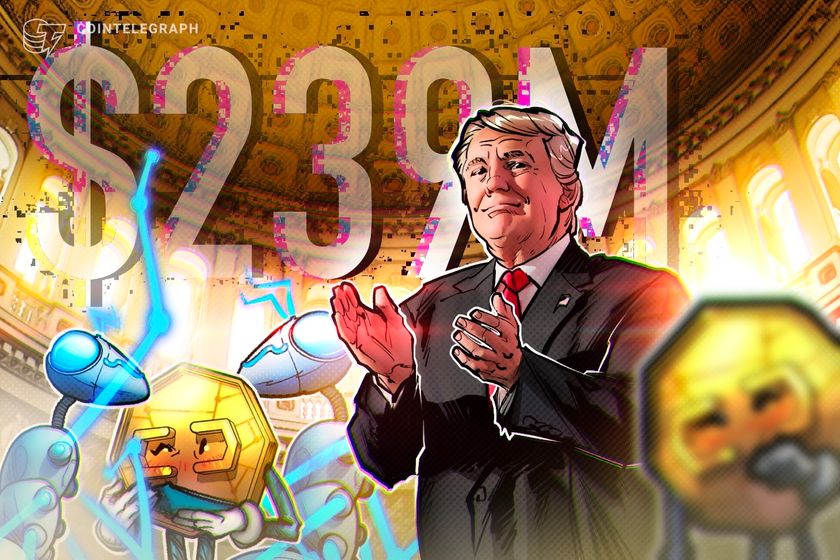

Opinion by: Sergej Kunz, co-founder of 1inch
Institutional players have been closely watching decentralized finance’s growth. Creating secure and compliant DeFi platforms is the only solution to build trust and attract more institutions.
Clear waters attract big ships
Over the past four years, institutional DeFi adoption has gone from 10% of hedge funds to 47%, and is projected to rise to 65% in 2025. Goldman Sachs is reaching their arms to DeFi for bond issuance and yield farming.
Early adopters are already positioning themselves in onchain finance, including Visa, which has processed over $1 billion in crypto transactions since 2021 and is now testing cross-border payments. In the next two years, institutional adoption will speed up. A compliant regulatory framework that maintains DeFi’s core benefits is necessary for institutional adoption to engage confidently.
DeFi’s institutional trilemma
It is no secret that many DeFi security exploits happen every year. The recent Bybit hack reported a $1.4 billion loss. The breach occurred through a transfer process that was vulnerable to attack. Attacks like these raise concerns about multisignature wallets and blind signing. This happens when users approve transactions without full details, rendering blind signing a significant risk. This case calls for stronger security measures and improvements in user experience.
The threats of theft due to vulnerabilities in smart contracts or mistakes by validators make institutional investors hesitate when depositing large amounts of money into institutional staking pools. Institutions are also at risk of noncompliance due to a lack of clear regulatory frameworks, creating hesitation to enter the space.
The user interface in DeFi is often designed for users with technical expertise. Institutional investors require user-friendly experiences that make DeFi staking possible without relying on third-party intermediaries.
Build it right, and they will come
Institutional interest in bringing traditional assets onchain is enormous, with the tokenized asset market estimated to reach $16 trillion by 2030. To confidently participate in DeFi, institutions need verifiable counterparties that are compliant with regulatory requirements. The entry of traditional institutional players into DeFi has led some privacy advocates to point out that it can counter the essence of decentralization, which forms the bedrock of the ecosystem.
Recent: Securitize to bring BUIDL tokenized fund to DeFi with RedStone price feeds
Institutions must be able to trust DeFi platforms to maintain compliance standards while providing a safe and seamless user interface. A balanced approach is key. DeFi’s permissionless nature can be achieved while maintaining compliance through identity profiles, allowing secure transactions. Similarly, transaction screening tools facilitate real-time monitoring and risk assessment.
Blockchain analytics tools help institutions to maintain compliance with Anti-Money Laundering regulations and prevent interaction with blacklisted wallets. Integrating these tools can help detect and prevent illicit activity, making DeFi safer for institutional engagement.
Intent-based architecture can improve security
The relationship between intent-based architecture and security is evident; the very design is built to reduce risks, creating a more reliable user experience. This protects the user against MEV exploits, a common issue of automated bots scanning for large profitable trades that can be exploited. Intent-based architecture also helps implement compliance frameworks. For instance, restricting order submissions to clean wallets and allowing resolvers to settle only the acceptable orders.
It’s well understood that in traditional DeFi transactions, users rely often on intermediaries like liquidity providers to execute trades or manage funds. This leads to counterparty risk, unauthorized execution and settlement failure. The intent-based architecture supports a trustless settlement that ensures users commit only when all conditions are met, reducing risk and removing blind trust from the picture.
DeFi platforms must simplify interactions and UX for institutional investors. This system bridges the gap between. Through executing offchain while ensuring security, the intent-based architecture makes DeFi safer and more efficient. However, one of the challenges to this includes integrating offchain order matching while maintaining onchain transparency.
Late adopters of DeFi will struggle to keep up
For the early adopters of DeFi, there is a competitive advantage in liquidity access and yield advantages, whereas late adopters will face more regulatory scrutiny and entry barriers. By 2026, the institutional players that have failed to adopt DeFi may struggle to keep up. This is seen in the examples of early adopters like JPMorgan and Citi’s early tokenization projects. TradFi leaders like them are already gearing up for onchain finance.
The way forward
Regulatory bodies, supervisory agencies and policy leaders must provide clear, standardized guidelines to facilitate broader institutional participation. Uniform protocols underpinning wider institutional involvement are underway. DeFi platforms must be prepared beforehand to provide all the necessary pillars of compliance and security to institutional players who want to embrace mainstream adoption. Executing this shall require combined efforts from regulators, developers and institutions.
Opinion by: Sergej Kunz, co-founder of 1inch.
This article is for general information purposes and is not intended to be and should not be taken as legal or investment advice. The views, thoughts, and opinions expressed here are the author’s alone and do not necessarily reflect or represent the views and opinions of Cointelegraph.



